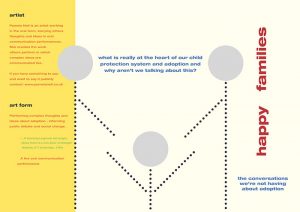
On Saturday October 28th 2017 we gathered again, this time in London, for the ‘oral installation performance’ about adoption and the problems caused by lack of honest and open conversation about its meaning and consequences.
The main questions Pamela and I hoped to pose were these:
- Can we make happy families?
- Can we impose identity on a child?
- Do we need to ‘rescue’ children or should we be trying to support unhappy families?
- What is really at the heart of our child protection system and adoption and why aren’t we talking about this?
Again, I was really pleased that the audience seemed keen to talk and the conversation was lively and wide ranging. It was also great to finally meet in person some of those I have been ‘talking’ to on line for some time now.
I hope that the conversations we started in Bristol on September 23rd and in London on October 28th can carry on elsewhere. If anyone reading this would like us to come and perform in your area, let me or Pamela know!
Themes emerging
A member of the audience recorded the following as those issues which attracted her attention:
- Is there another side to the issue? The talk seemed to imply that adoption is negative, but if so, what’s the alternative?
- Who is going to do the research into outcomes? How is it to be funded?
- Adoption seems to involve ideological judgement and even social engineering, and is used as a solution to problems within the care system generally. Why isn’t there conversation about all the possible consequences, good and bad, short and long-term, for everyone involved?
- Why isn’t there legal and financial help for, say, the parents of split siblings, to enable a sense of family to persist?
- Social media has raised the profile and voice of adopters, but again, it is usually the articulate middle classes who benefit. How can this be made more of a level platform?
- How successful is the assessment process at preparing adopters to be parents?
- Are support services adequate in the era of austerity, particularly in view of the needs that may arise in adopted children from different backgrounds?
- What qualifies a parent for serious intervention such as psychotherapy? There is no clinical criteria, and the distribution of these resources seems to depend on how wealthy and/or how vocal you are.
- Is the problem that research may be carried out but is unheeded by policy makers? If so, is it because of (lack of) money? Or prevailing ideology? Or lack of belief in public discourse by the general public?
- The UK concept of ‘childhood’ is adult-led, which is behind the times compared to much European thinking. Should the UK widen its perspective?I]
- Is it worth saying that you can’t prevent the death of every child deemed to be at risk, regardless of any external circumstances? There would and will always be cases like Baby P, leading to knee-jerk reactions by the media, and potentially causing as much harm as good.
- How do you counteract false narratives that are propagated by sections of the media for political ends?
- Should there be a set timeline for adoption or not? If yes, what should it be? If no, how do you set parameters?
- Is there a wider question about the way society undervalues diversity and views disadvantage?
- How can we stop money being wasted by the government on high-profile, ‘scattergun’ interventions which are often shown to have achieved nothing when they are evaluated by practitioners?
- How big a problem is trafficking of children? Can we believe the narratives in the media?
Comments from the audience
I have just started my MA in Social Work and this has made me aware of some disturbing elephants in the room and what sort of actions I need to think about supporting.
I found the method of presentation simple, powerful, effective. I thought Your performance Sarah was excellent. It was gripping. I think you didn’t need to try and answer the q’s ( except the first that was framed firmly as a q to you).
It didn’t make me think afresh about adoption as i already do but it was good to be able to ‘come out’ on those views in a public debate. My sense is that there has been a big shift in recent years to voices accepted as credible (rather than othered as disgruntled or extremists – some of course, being actually so) being able to question current adoption policy & practice.
I think you could have done even more to engage w evidence in support of adoption & eg the idea that it was precisely because Jobs was removed & adopted that he developed capacity & opportunity to have such an impact. Tho u said u had no views the choices about what material used & ansa’s given suggested u had strong views that much is broken & dysfunctional, just not on how to achieve change & what good wld like.
